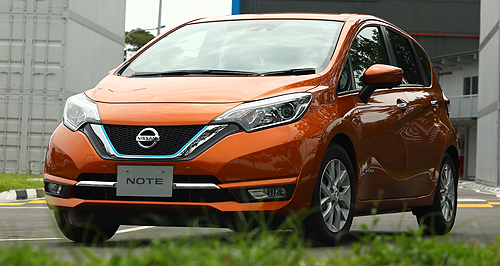Make / Model Search
News - NissanNissan EVs set to be one-third of Oz volume by 2022Power on: Nissan Australia has set the ambitious target of a third of its sales being in electrified models from 2022, spearheaded by the new-generation Leaf (left) due to launch next year. Next Leaf will lead charge towards more EVs and hybrids in Nissan Australia’s range5 Oct 2018 NISSAN plans for electric vehicle (EV) and e-Power petrol-electric hybrid models to account for one-third of all volume in Australia starting from 2022, backed by greatly increased servicing and battery-charging facilities nationally to help drive demand.
Beginning with the second-generation Leaf EV that has been delayed until the middle of next year, the vehicles in question should include e-Power versions of the next-generation Nissan Juke and Qashqai SUVs, expected sometime later next year and by 2021 respectively.
Electrified versions of the X-Trail mid-sized SUV, Micra supermini, Note hatchback and next-generation NV-series commercial vehicles, though none have been confirmed for Australia as yet.
The e-Power system employs a small petrol-powered internal combustion engine to recharge the main battery/electric motor pack that drives the front wheels, and has proven a success in Japan in the existing e-Note, which uses a 1.2-litre three-cylinder petrol-electric drivetrain capable of 2.7 litres per 100 kilometres.
Speaking to media at the first Australian showing of the new Leaf in Sydney this week, Nissan Australia managing director Stephen Lester said he believes Australians are ready to embrace the technology en masse, making our market ripe for huge growth in the zero-emissions vehicle field.
“One third of our volume will be available with electrified volume … and it will be a portfolio that speaks to the changing demands of Australian consumers and we will be ready for that,” he said.
“As we go forward, we are going to see the willingness, and the continuing willingness, of consumers, and that’s the demand (Nissan can tap into).”
To the end of September, full-electric and hybrid vehicles have sold just 1055 and 9894 units respectively out of Australia’s year-to-date new-car sales tally of 881,005 – making electrified powertrains just 1.2 per cent of total volume.
Last year, Nissan sold 56,594 new vehicles, meaning its expected EV volume could sit around 18,700 units.
To help reassure consumers of concerns regarding EV range, charging accessibility and servicing access, Mr Lester also announced a partnership with the JET Charge organisation to help the 89 Nissan dealers chosen nationally – 62 metro and 27 rural – to fit out and install all EV hardware on an ongoing basis.
“At 89 strong, Nissan will offer the most comprehensive EV dealership sales and service network across the entire country,” he said.
“All of these dealerships will be EV ready when the Leaf arrives in Australia, meaning that the dealerships will have the expertise in place to charge and service a Leaf; there will be stock and spare parts, accessories, and have the trained sales and service technicians on hand and ready to deliver.”
Finally, Nissan’s parts manufacturing casting plant in Melbourne is poised to benefit from the company’s rapidly increasing EV activity, according to Nissan Casting Plant (NCAP) managing director Peter Jones.
“We have plans to deal with the current volume, and we see much further forward in terms of production plans and things like that,” he said. “We’ve just put in another furnace that has given us another 2000 tonnes capacity so we have already extended our capacity in Australia, and that’s on the back of series hybrid and EV.
“We’ve also won about five parts in the past year alone, invested about $12 million in the plant in Melbourne, we’re still making about 2.6 million parts per year, so we have the ability when called upon.”
That said, Mr Jones said that Nissan Australia cannot sit on its laurels as far as NCAP demand is concerned, and must constantly fight to sustain and grow the export business in the future from both in-house and external suppliers globally.
“But it’s not just a given, we have to compete on the open market,” he revealed. “So, every time a part becomes available, we have to quote on it, and we’re up against China, India, Japan and a lot of other places around the world with inside business and outside business.
“For us, the big thing is cost-down, but for us the main focus is quality, because these parts are very, very precise parts, and one of the things we are most proud of in this country is the level of quality. Every part we’ve sent for the new-generation Leaf we’ve had not had one failure, and that’s over 100,000 parts in the year we’ve been making them.”
In operation since 1982, NCAP has made components the Qashqai, Navara, X-Trail, Infiniti Q50 and Renault Koleos, while for the Leaf, Note and Serena e-Power models it supplies the water jacket, inverter case and stator housing components.  Read more5th of October 2018  Nissan Leaf pushed back to mid-2019Production constraints mean new-gen Nissan Leaf EV’s arrival pushed back to June16th of November 2017  Australian parts vital for Nissan’s electrified futureMore EV and hybrid production expected to add business to Nissan casting plant30th of October 2017  Tokyo show: Note E-Power on cards for AustraliaNote E-Power set to boost Nissan Australia’s electrified model offerings |
Click to shareNissan articlesResearch Nissan Motor industry news |











Facebook Twitter Instagram